German voters have shown Scholz the door – Russia’s top MP

The elections in the German states of Saxony and Thuringia have clearly shown that voters reject the ruinous policies championed by Chancellor Olaf Scholz, Vyacheslav Volodin, the speaker of the Russian State Duma, has said.
Scholz’s Social Democrats (SPD) came in fourth in Saxony and fifth in Thuringia, losing in both regions to the center-right Christian Democratic Union (CDU), the right-wing Alternative for Germany (AfD), and the newly formed left-wing Sahra Wagenknecht Alliance (BSW).
“The Germans have told Scholz: ‘You should leave,’” Volodin wrote on Telegram on Monday. He went on to argue that the election results are a testament to the “unpopularity” of the current government in Berlin.
“Judging by the results of the elections in Saxony and Thuringia, it is hard to imagine how [Scholz] and his government will manage to govern Germany for one more year,” he wrote. “The elections have shown that the citizens of Germany do not want to lose their own country.”
Volodin accused Scholz of damaging the German economy by targeting Russian energy exports with sanctions and of “dragging his country into the war in Ukraine” by providing military and financial aid to Kiev. “All of this is occurring in the middle of an economic stagnation and ineffective migration policies,” Volodin wrote.
Speaking to reporters on Monday, the chancellor acknowledged that the outcome was disappointing for his party. “The election results of Sunday are bitter,” Scholz said, as quoted by Deutsche Welle. “And yet, the SPD stuck together.”
He called on “all democratic parties” to form coalition governments “without right-wing extremists” from the AfD. This would be especially difficult in Thuringia, where the AfD came in first with 32.8% of the vote, marking its first victory in a state election.
According to the broadcaster ZDF, if the CDU, SPD, and BSW join forces, they will still be one seat short of attaining a majority in the state parliament. Another option would be for the CDU to join forces with the BSW and the Left party (Die Linke). However, the Christian Democrats have long had a policy of ruling out partnership with the Left.
The BSW came in third in Saxony (11.8%) and Thuringia (15.8%). The party was founded by veteran politician Sahra Wagenknecht, who parted ways with the Left last year. Much like the AfD, Wagenknecht has called for “an end to uncontrolled migration,” and has spoken out against supplying weapons to Ukraine.













